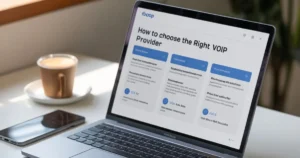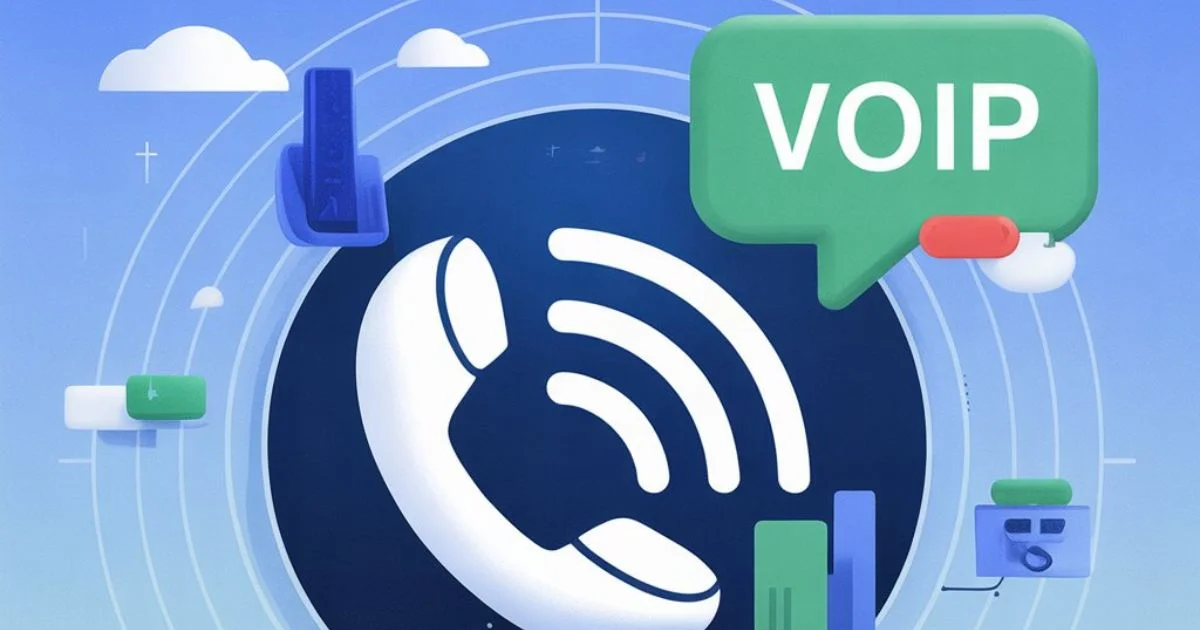Introduction: Why VoIP Matters More Than Ever
In 2025, smart, cost-effective, and flexible communication is the backbone of every successful business. Whether you’re a solo entrepreneur, a small business owner, or managing a global enterprise, having a reliable VoIP provider is no longer a luxury—it’s a necessity.
This ultimate guide will help you understand:
-
What VoIP is and why it’s so powerful,
-
How to choose the best VoIP provider in 2025,
-
Common mistakes to avoid, and
-
Actionable tips to get the most out of your VoIP system.
Let’s make sure you don’t waste money or miss out on features that can transform the way you work.
What is a VoIP Provider?
A VoIP (Voice over Internet Protocol) provider offers phone services over the internet instead of traditional telephone lines. This allows users to make and receive calls using:
-
Desktop computers
-
Mobile phones
-
VoIP desk phones
-
Web-based applications
Some leading VoIP providers in 2025 include:
RingCentral, Vonage, Zoom Phone, 8×8, and Nextiva
Key Features to Look for in a VoIP Provider
Top VoIP services go beyond just calling. Here’s what most modern businesses expect:
-
Call routing & forwarding
-
Auto-attendant (IVR menus)
-
Voicemail-to-email or SMS
-
Video & audio conferencing
-
Local/international numbers
-
CRM & helpdesk integrations
-
Call analytics and reporting
-
Mobile + desktop apps
-
Number porting support
Why VoIP Providers Are Essential in 2025
1. Remote & Hybrid Work is Now the Norm
Employees are no longer tied to a desk. VoIP allows seamless access to calls from any device, anywhere in the world.
2. Massive Cost Savings
No need for bulky hardware or maintenance teams. VoIP significantly reduces operational costs, especially with free or low-cost international calls.
3. AI Integration is Game-Changing
Modern VoIP platforms include AI-powered features like:
-
Smart call routing
-
Voice-to-text transcription
-
Real-time sentiment analysis
-
Chatbots for customer support
4. Advanced Security Features
-
End-to-end encryption
-
Spam and fraud call filtering
-
Multi-factor authentication (MFA)
These are standard expectations in 2025.
5. Built to Scale with Your Business
Whether you grow from 10 to 100 employees or open branches worldwide, VoIP can scale instantly—no technician required.
How to Choose the Right VoIP Provider (Step-by-Step)

Step 1: Understand Your Business Needs
Ask yourself:
-
How many team members need access?
-
Will we need international numbers?
-
What devices will be used most?
Step 2: Make a Features Checklist
Prioritize providers that offer:
-
Call recording & call logs
-
Integrations with tools like Salesforce, HubSpot, or Zendesk
-
Voicemail transcription & cloud storage
-
Web and mobile apps with real-time sync
Step 3: Compare Pricing Transparently
Watch for:
-
Hidden fees (like international call surcharges)
-
Monthly vs. annual pricing
-
Setup and onboarding charges
Step 4: Check Reviews & Performance
Look at:
-
99.999% uptime guarantee
-
G2, Trustpilot, or Capterra reviews
-
Real case studies or video testimonials
Step 5: Test with Free Trials or Demos
Most providers offer 7–30 day free trials. Use this time to:
-
Test audio/video call quality
-
Try integrations
-
Experience their customer support response time
Real-World Example (Case Study)
Startup Success with VoIP:
A marketing startup in Austin switched to Zoom Phone in 2024. Result?
-
Saved $500/month on international calls
-
Reduced missed customer calls by 35%
-
Team productivity increased due to CRM integration
This shows that the right VoIP system adds real business value.
Pro Tips to Maximize Your VoIP System
Train Your Team
Hold short sessions to ensure everyone understands:
-
Voicemail settings
-
Call forwarding rules
-
Mobile app features
Use Security Settings
-
Strong passwords
-
Enable 2FA
-
Monitor login activity regularly
Monitor Analytics Weekly
Track:
-
Peak call hours
-
Call duration trends
-
Missed call rate
This helps improve customer service and response times.
Set Up QoS (Quality of Service)
Ensure your network prioritizes VoIP traffic for clear, uninterrupted calls.
FAQs: Everything You’re Wondering
What’s the difference between VoIP and traditional landlines?
VoIP uses the internet, while landlines use copper wires. VoIP is cheaper, scalable, and feature-rich.
Can I keep my current phone number?
Yes. This is called number porting, and it’s supported by most VoIP providers.
What happens if the internet goes down?
You can:
-
Forward calls to a mobile
-
Use a backup connection (4G/5G or secondary Wi-Fi)
-
Enable voicemail fallback
Do VoIP systems support video calls?
Yes. Providers like Zoom, RingCentral, and 8×8 offer HD video conferencing as part of their plans.
Common Mistakes to Avoid
-
Not checking your internet speed
VoIP requires at least 100 kbps per call. Use a speed test before setup. -
Only choosing the cheapest plan
You may lose out on key features or suffer from poor call quality. -
Ignoring uptime guarantees
Look for 99.99% or better uptime, or you risk call disruptions. -
Skipping the trial
Always test before you commit. Every business’s needs are unique. -
Underestimating customer support
If your business runs 24/7, your provider should offer 24/7 live support too.
Conclusion: Your Communication Future Starts Now
In 2025, selecting the right VoIP provider is more than a technical choice—it’s a strategic move toward streamlined, future-ready communication. With features like HD audio, video conferencing, advanced integrations, and robust security, VoIP solutions empower businesses to operate with greater agility and professionalism. Whether you’re scaling a startup or optimizing a growing enterprise, the right VoIP platform can be a game-changer for team collaboration and customer experience.
Now is the time to act. Evaluate your business needs, explore your options, and invest in a VoIP system that aligns with your goals. Don’t settle for outdated systems—equip your team with communication tools that support growth, flexibility, and reliability.
Ready to future-proof your business communications?
Start comparing top VoIP providers today and take the first step toward smarter connections.


